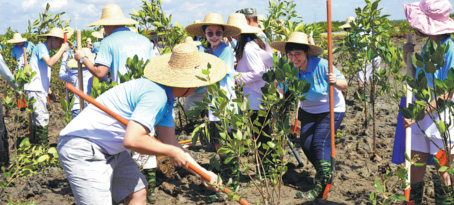Mangroves flourish with green efforts

Taking advantage of its distinctive cultural and green resources, Zhanjiang in Guangdong province is constructing a mangrove eco-tourism economic belt and promoting harmonious coexistence between humans and nature in the context of Chinese-style modernization.
The city has China's most concentrated distribution of natural mangrove reserves, covering 6,398.3 hectares and accounting for 60.1 percent of the total in Guangdong and 23.7 percent of the national total.
Making good use of the advantageous resources of its mangrove areas, Zhanjiang has launched several high-quality tourism routes highlighting sustainable gastronomy, rural vitalization and family-friendly activities. The Jinsha Bay Mangrove Ecotourism Center in downtown Zhanjiang is a typical example, always crowded with visitors thanks to its picturesque natural view and educational values.
"In the past, tourists in Jinsha Bay were mainly concentrated along the southern beach and in the swimming area. The center greatly enhances both the city's ecological and social benefits," said Li Haifeng, who oversees environmental sanitation management at the center.
The Zhanjiang Mangrove Wetland Protection Regulations came into effect in January, establishing the first local policy in Guangdong specifically aimed at the protection of mangrove wetlands and the first city-level mangrove protection and restoration plan in the country. The regulations standardize activities related to the protection, restoration, management and utilization of the city's mangrove wetlands, providing a legal guarantee for the construction of a beautiful and green "City of Mangroves".

Young people from Guangdong, Hong Kong and Macao get together to plant mangroves in Zhanjiang, Guangdong province. WU DONGJUN/FOR CHINA DAILY
During the National People's Congress in early March, Zhanjiang Mayor and NPC deputy Zeng Jinze said the city is boosting the conservation, restoration and sustainable management of the mangrove areas of Jinniu Island at a high level, noting it has formulated the Zhanjiang Jinniu Island Mangrove Area Protection and Utilization Plan and made the Jinniu Island mangrove area a demonstration zone for the construction of landscape sites at the provincial, city and district levels.
Currently, Zhanjiang is accelerating construction of two mangrove demonstration areas each covering an area of more than 666.67 hectares in Leizhou city and Xuwen county. By 2023, Leizhou had created 133.4 hectares of mangroves and restored 107.6 hectares, while Xuwen had created 431 hectares of mangroves.
The city is also making efforts in service, financial support and charity to bolster sustainable development of mangroves. For example, China's first charity trust project targeting the protection of mangrove ecology, called the Marine Saihanba Blue Carbon Promotion Charity Trust Plan, was initiated in Zhanjiang in August 2023, and the Zhanjiang Mangrove Wetland Protection Foundation has signed cooperation agreements with key enterprises, including Baosteel, BASF, Sinopec and the Tencent Charity Foundation.
Other key initiatives include the Guangdong Mangrove Carbon Inclusive Methodology, the first blue carbon inclusive methodology in the country, aimed at solving the problems of quantifying and realizing carbon sequestration in mangroves, and innovating the "Zhanjiang Standard "for carbon sequestration accounting.
In addition, Zhanjiang has taken the lead in Guangdong in carrying out pilot projects of coupled planting and aquaculture in mangrove areas, effectively solving restoration problems, obtaining seven technical guides and a series of technological achievements, developing high value-added products, and striving to forge a new model of win-win cooperation between mangrove protection and aquaculture development.







